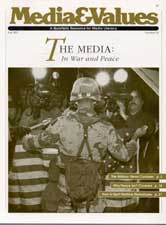Media Images Pitch War for Profit
|
This article originally appeared in Issue# 56
|
Like many other media events, the lure of Persian Gulf war profits brought out the worst in many marketers. Not patriotism, not pride, not even the prospect of peace seemed as important for many as the commercial value of these ideals.
"We're trying not to do things to commercialize the war," a spokesperson for a prominent Washington, D.C. department store claimed during the conflict. Such restraint shows respect for the men and women involved in the armed forces and makes a sober statement about war's deathly realities. It also honors national value systems and symbols through an unwillingness to profane core beliefs by equating them with idle consumption.
But such lofty ideals are the exception. "Patriotic merchandise," as a Bloomingdale's CEO approvingly called it, was more in commercial vogue. Retailers rallied around the flag to push products. In the "Stars & Stripes" shop at New York City's Bloomingdale's, for example, the varieties of "patriotic merchandise" included a daily red, white and blue parade of housewares, designer clothes, pillows and even appropriately colored tins of bubblegum. Incredible. Profit and frivolity working in tandem to exploit the tragedy of war.
Corporate opportunism also frequently hides behind the veil of patriotism. Take, for example, Nynex Corporation's wartime television ads. The telecommunications company, which spends $20 million annually on image advertising, hired a New York ad agency (Sawyer/Miller Group) to produce a soft-sell commercial suitable for the military coverage "news environment." Taking advantage of lower wartime ad rates, Nynex situated its commercial image between the soldiers on the front lines and their families at home.
The soft-sell idea aims to touch the hearts of Americans while tapping their wallets. And, of course, Nynex was not alone in this commercial campaign venture. Anheuser-Busch rolled out its 1985 "Here's To You, America" Budweiser ad, while Boeing recycled its "America the Beautiful" commercial, replete with a Marine playing taps at a cemetery. Not to be outdone, Lorillard (the makers of Kent, Newport and True cigarettes) printed yellow stripes on the corners of its print and billboard ads. The companies' actual wartime message, of course, was more like "Here's to Us, America." But not all war opportunism was so subtle.
The military-toy business folks were busy capitalizing on the war in much more open ways. Desert camouflage color is still being sprayed on every war toy in sight. New toy lines flaunt "Operation Desert Storm" labels. Behind all the kiddie hype is a raw message to parents: "Be American, buy our Gulf War toys."
War is a terrible, solemn fact. We may support it or oppose it. But we should not allow marketers to demean the solemnity of the war by capitalizing on it. In Amman, Jordan there were "Saddam burgers" and "Scud sandwiches." "Scuds are the best thing for business," said a Jordanian marketer. Though their political messages are different, the commercial mindset of these Jordanians and their American counterparts is the same--there is profit in war, though U.S. marketers amplify their messages with multi-million-dollar ad campaigns.
Neither "patriotic" bubblegum tins nor "patriotic" sandwiches represent who we are or should be. Likewise, soft-sell ploys seek to rob us of our symbols and sentiments by enlisting them in the service of sales. In the end, there is nothing noble about pitching war for profit.



